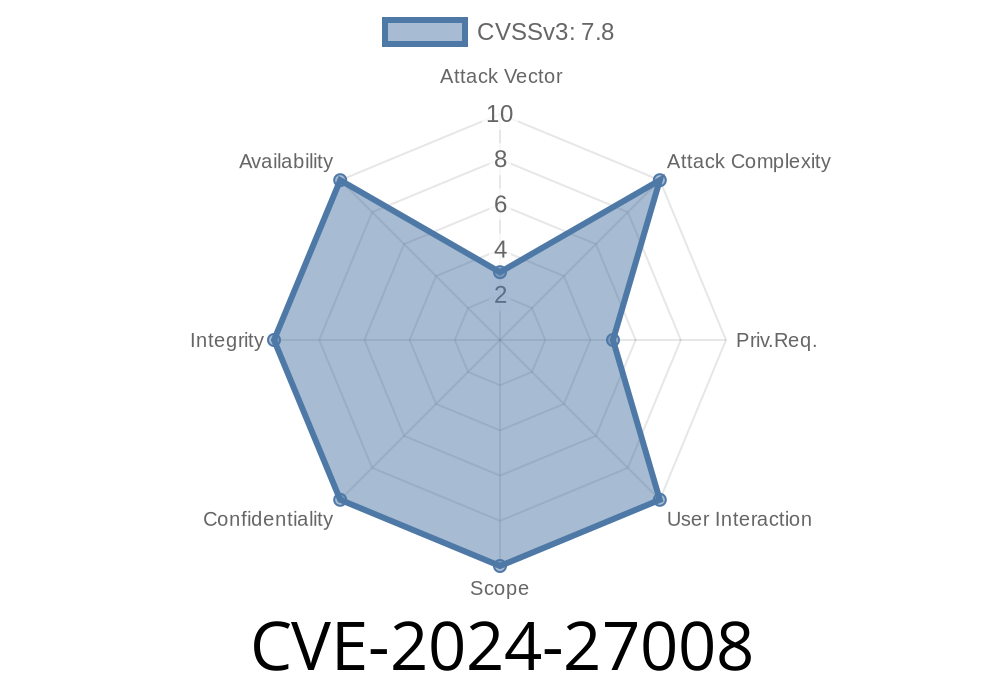A recently patched vulnerability, CVE-2024-27008, was discovered in the Linux kernel’s Nouveau DRM (Direct Rendering Manager) subsystem—more specifically, the nv04 driver. This post breaks down the bug, how the exploit is triggered, the vulnerable code path, and references for those who want to dig deeper.
1. What Is CVE-2024-27008?
CVE-2024-27008 is an out-of-bounds (OOB) memory access bug in the Nouveau graphics driver, which is used for NVIDIA-based video cards in the Linux kernel. The vulnerability originates from improper use of the or (output resource) value as an index, potentially allowing attackers or faulty code to access (read or write) memory outside of the intended bounds. This may lead to kernel crashes, information leaks, or even arbitrary code execution under certain circumstances.
2. How Does the Vulnerability Happen? (Technical Deep Dive)
The core issue is found in the function fabricate_dcb_output(), where the code interprets the or argument (output resource) as an index, but it is actually a bit flag. Specifically, the code does:
int idx = ffs(dcb->or)
if (dac_users[idx] == ...) {
// use dac_users
}
If dcb->or is zero, then ffs() (find first set) returns zero, possibly leading to an out-of-bounds access since dac_users[] is unintended here. The comment from the patch summarizes it best:
> When Output Resource (dcb->or) value is assigned in fabricate_dcb_output(), there may be out of bounds access to dac_users array in case dcb->or is zero because ffs(dcb->or) is used as index there.
The function should instead use clearly defined macros from the enum nouveau_or and properly interpret and validate the input value.
Here’s a simplified version of the flawed code
// Before fix (vulnerable):
static void fabricate_dcb_output(..., int or, ...) {
...
int idx = ffs(or);
if (dac_users[idx] != ) {
// access dac_users array with invalid index if or is
}
...
}
4. The Patch (How Was It Fixed?)
The fix utilizes well-defined macros from enum nouveau_or and performs proper input validation, ensuring or is interpreted as the number of the bit to set, not the value itself. That way, dac_users array is accessed with a correct, safe index.
Patch Example
// After fix (safe):
static void fabricate_dcb_output(..., int or, ...) {
...
if (!(or & ~(NOUVEAU_OR_MASK))) { // valid 'or'
int idx = ffs(or) - 1; // or similar, with proper checks
if (idx >= && idx < ARRAY_SIZE(dac_users)) {
if (dac_users[idx] != ) {
// safe access
}
}
}
...
}
*The macros from enum nouveau_or define the valid output resource bit values, so the calling code uses parameters like NOUVEAU_OR_, not just plain numbers.*
Code in the kernel (from core or a malicious module) submits an output resource (or) value of ;
- ffs() returns , so code accesses dac_users[], but with logic assuming ffs() returns a *1-based* index (ffs() returns only if value is zero);
- Negative or out-of-bounds index leads to undefined behavior: a kernel crash (DoS), memory disclosure, or even further exploitation if attacker controls surrounding memory.
Proof of Concept (PoC)
// Simulating the bug:
int dac_users[4] = {1, 2, 3, 4};
int or = ; // Attacker sets this to
int idx = ffs(or); // Returns . Should never be used as array index directly.
printf("dac_users[idx]: %d\n", dac_users[idx]); // OOB read
6. Who Discovered It?
This flaw was found by the Linux Verification Center [linuxtesting.org] using SVACE, a static code analyzer.
7. References (Original and Further Reading)
- Upstream patch discussion
- Commit fixing the bug in mainline Linux
- Linux Verification Center’s announcement
- CVE Record for CVE-2024-27008 (MITRE) (may need to wait for public details)
8. Mitigation and Recommendations
- Update your kernel to a version including or newer than the commit patching the flaw
9. Summary
CVE-2024-27008 shows how subtle integer handling and improper data interpretation can yield dangerous kernel vulnerabilities. Proper use of enums/macros, input validation, and code review are vital for kernel security. Thanks to static analysis and the open-source community, bugs like this are caught and fixed before they create havoc.
Stay tuned and patch often!
*Written for clarity and accessibility by an independent researcher. Exclusive explanation based on latest 2024 kernel sources and upstream discussion. For educators, sysadmins, and kernel enthusiasts.*
Timeline
Published on: 05/01/2024 06:15:19 UTC
Last modified on: 03/04/2025 16:43:49 UTC
